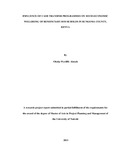| dc.description.abstract | Conditional cash transfers are increasingly being promoted as the best practice in the
social sector for developing countries. In Kenya, Orphans and Vulnerable Children Cash
Transfer was introduced as the first cash transfer programme on pilot basis in 2004 in
response to the impacts of Human Immuno Virus and Acquired Immuno Deficiency
Syndrome on children in the country. After 2004, the government of Kenya expanded
the coverage of the Orphans and Vulnerable Children Cash Transfer, and started cash
transfer programmes for other vulnerable groups, yet there were no extensive empirical
studies carried out to determine the influence of the programme on socio-economic
wellbeing of the households. The purpose of this study was to evaluate the influence of
cash transfer programme on the socio-economic wellbeing of beneficiary households in
Bungoma County of Kenya. The objectives of the study were to establish how caregivers
registered on Orphans and Vulnerable Children Cash Transfer in Bungoma County use
the money transferred to households, determine the influence of Orphans and Vulnerable
Children Cash Transfer programme on the social wellbeing of beneficiary households
and assess influence of the Orphans and Vulnerable Children Cash Transfer programme
on economic wellbeing of the beneficiary households. The study also sought to establish
measures that needed to be implemented to enhance contribution of the Orphans and
Vulnerable Children Cash Transfer programme on improvement of socio-economic
wellbeing of households in Bungoma County. The study was based on Robert Putman’s
1995 theory of Social Capital. The study adopted a descriptive survey research design.
The target populations for the study were 250 caregivers registered on the Orphans and
Vulnerable Children Cash Transfer programme in 2006. The study involved a sample of
75 caregivers selected through multistage sampling. The data for the study was collected
by use of questionnaires, Focus Group Discussions and content analysis, and analyzed
using descriptive statistics. The study found that majority of caregivers used the money
they received from Orphans and Vulnerable Children Cash Transfer to meet educational
needs of the children; the programme had contributed to good relations within the
beneficiary households, but had led to emergency of deep jealousy against beneficiary
households; and, the programme had positive influence on economic wellbeing of
beneficiary households, but had not removed the beneficiary households from extreme
poverty. The study recommended that mechanisms be introduced to provide opportunity
for children in households to participate in making decision on use of money transferred
to households and in evaluation of the programme to enhance safeguards against possible
misuse of funds by caregivers; the community to be sensitized on the programme
objectives and enrollment criteria to reduce ill feelings against beneficiaries; the amount
disbursed to be increased, and the programme be re-designed to include conditions
requiring beneficiaries to invest part of the money in economic development; and
programme designed to consider household characteristics such as number of children in
determining amount of money transferred to beneficiaries households. The study
suggested a research to be carried out focusing on children in the beneficiary households
to establish their views on aspects focused on in this study. | en |

